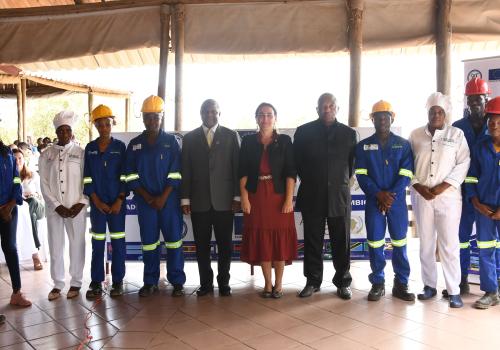The terrorist and violent extremism in Cabo Delgado province in northern Mozambique is not a problem for Mozambique and the Southern African Development Community (SADC) alone, but is a problem for the entire world, prominent Mozambican cleric and civil society leader, Bishop Dinis Matsolo, has said.
Bishop Matsolo was among representatives of civil society, police, correctional services, and women and youth groups who were invited to speak at the presentation of the preliminary results of the Early Response Mechanism (ERM) in Pemba on 12th September 2022. ERM is an initiative of the SADC Peace Building Support to Mozambique which was funded by the European Union,
The ERM seeks to pacify the security situation in Cabo Delgado Province which continues to be relatively calm but unpredictable due to the threat posed by terrorist activities. A number of activities have been undertaken by the SADC Peace Building Support project under ERM to provide for humanitarian assistance and multidimensional peacekeeping which entails, among others, the involvement of civilians to undertake confidence building measures and programmes, aimed at addressing mistrust within the communities.
Bishop Matsolo commented efforts by the SADC Mission in Mozambique (SAMIM) and the ERM programme, but said it would be a great mistake if people started believing that the problem in Cabo Delgado would be solved by the military alone. He said as religious leaders, they believed that dialogue was cardinal in resolving the terrorist problem. He proposed an inter-religions dialogue where leaders of different faiths in the province would meet and show that they were together in fighting against terrorism. This would dispel the notion that the conflict was based on religion.
Bishop Matsolo also proposed an inter-community dialogue to address the plight of internally displaced people in Cabo Delgado, as well as an inter-generational dialogue in order to share values with the youths to promote social cohesion. He said civil-military relations should not be underestimated and downplayed because there was a need for a sound relationship as the community should act as the local intelligence.
Superintendent Jose Luis Tomocene, who represented the Ministry of the Interior, thanked SAMIM and the EU for organising and funding the workshop to strengthen the capabilities and skills of the police in various domains.
The workshops imparted knowledge on community-oriented policing, protection of civilians, legal instruments for the promotion of human rights, rule of law and use of force, and this constituted an added value for the co-operation as well the building of peace in Mozambique, he said. The acts of terrorism at the global level required the police to review their existing mechanisms and capabilities at continental and regional levels in order to effectively address the multiple security challenges.
Mr Gaspar Junior Saide, the Provincial Director for Correctional Services, expressed gratitude for the training rendered to correctional officers under the ERM programme. He said his department was aware that terrorists use psychological and physical violence to harm society, but correctional services officers were firm in their mission to allow society to move forward without fear of terrorism. The training workshops had imparted theoretical and practical knowledge to correctional services officers to fight terrorism and violent extremism, and protect society, he added.
A representative of women trained under ERM hailed the programme for teaching women from Cabo Delgado affected by the conflict on the dangers of gender-based violence (GBV) and imparting in them life skills in culinary, entrepreneurship, and small business management. She said she was convinced that with the knowledge acquired during the workshops, the women would be in a position to carry the message of GBV back to their communities and would be regarded as social agents for change.
A representative of the youths also thanked ERM for training them skills such as plumbing, carpentry, welding, farming and cooking. She said the training was vital as it addressed issues that the youths in the affected communities needed. She hoped such training programmes would be extended so as to give the youths more opportunities and the chance to rebuild their country.

